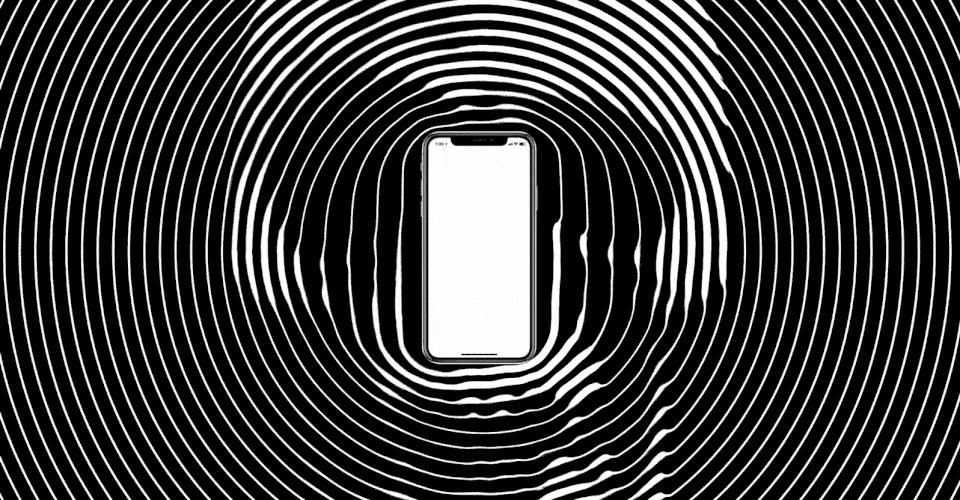The ‘Dead-Internet Theory’ Is Wrong but Feels True

If you search the phrase i hate texting on Twitter and scroll down, you will start to notice a pattern. An account with the handle @pixyIuvr and a glowing heart as a profile picture tweets, “i hate texting i just want to hold ur hand,” receiving 16,000 likes. An account with the handle @f41rygf and a pink orb as a profile picture tweets, “i hate texting just come live with me,” receiving nearly 33,000 likes. An account with the handle @itspureluv and a pink orb as a profile picture tweets, “i hate texting i just wanna kiss u,” receiving more than 48,000 likes.
There are slight changes to the verb choice and girlish username and color scheme, but the idea is the same each time: I’m a person with a crush in the age of smartphones, and isn’t that relatable? Yes, it sure is! But some people on Twitter have wondered whether these are really, truly, just people with crushes in the age of smartphones saying something relatable. They’ve pointed at them as possible evidence validating a wild idea called “dead-internet theory.”
Let me explain. Dead-internet theory suggests that the internet has been almost entirely taken over by artificial intelligence. Like lots of other online conspiracy theories, the audience for this one is growing because of discussion led by a mix of true believers, sarcastic trolls, and idly curious lovers of chitchat. One might, for example, point to @_capr1corn, a Twitter account with what looks like a blue orb with a pink spot in the middle as a profile picture. In the spring, the account tweeted “i hate texting come over and cuddle me,” and then “i hate texting i just wanna hug you,” and then “i hate texting just come live with me,” and then “i hate texting i just wanna kiss u,” which got 1,300 likes but didn’t perform as well as it did for @itspureluv. But unlike lots of other online conspiracy theories, this one has a morsel of truth to it. Person or bot: Does it really matter?
Dead-internet theory. It’s terrifying, but I love it. I read about it on Agora Road’s Macintosh Cafe, an online forum with a pixelated-Margaritaville vibe and the self-awarded honor “Best Kept Secret of the Internet!” Right now, the background is a repeated image of palm trees, a hot-pink sunset, and some kind of liquor pouring into a rocks glass. The site is largely for discussing lo-fi hip-hop, which I don’t listen to, but it is also for discussing conspiracy theories, which I do.
In January, I stumbled across a new thread there titled “Dead Internet Theory: Most of the Internet is Fake,” shared by a user named IlluminatiPirate. Over the next few months, this would become the ur-text for those interested in the theory. The post is very long, and some of it is too confusing to bother with; the author claims to have pieced together the theory from ideas shared by anonymous users of 4chan’s paranormal section and another forum called Wizardchan, an online community premised on earning wisdom and magic through celibacy. (In an email, IlluminatiPirate, who is an operations supervisor for a logistics company in California, told me that he “truly believes” in the theory. I agreed not to identify him by name because he said he fears harassment.)
Peppered with casually offensive language, the post suggests that the internet died in 2016 or early 2017, and that now it is “empty and devoid of people,” as well as “entirely sterile.” Much of the “supposedly human-produced content” you see online was actually created using AI, IlluminatiPirate claims, and was propagated by bots, possibly aided by a group of “influencers” on the payroll of various corporations that are in cahoots with the government. The conspiring group’s intention is, of course, to control our thoughts and get us to purchase stuff.
As evidence, IlluminatiPirate offers, “I’ve seen the same threads, the same pics, and the same replies reposted over and over across the years.” He argues that all modern entertainment is generated and recommended by an algorithm; gestures at the existence of deepfakes, which suggest that anything at all may be an illusion; and links to a New York story from 2018 titled “How Much of the Internet Is Fake? Turns Out, a Lot of It, Actually.” “I think it’s entirely obvious what I’m subtly suggesting here given this setup,” the post continues. “The U.S. government is engaging in an artificial intelligence powered gaslighting of the entire world population.” So far, the original post has been viewed more than 73,000 times.
Obviously, the internet is not a government psyop, even though the Department of Defense had a role in its invention. But if it were, the most compelling evidence to me is the dead-internet theory’s observation that the same news items about unusual moon-related events seem to repeat year after year. I swear I’ve been saying this for years. What is a super flower blood moon? What is a pink supermoon? A quick search of headlines from just this month brings up: “There’s Something Special About This Weekend’s Moon,” “Don’t Miss: Rare, Seasonal ‘Blue Moon’ Rises Tonight,” and “Why This Weekend’s Blue Moon Is Extra Rare.” I just don’t understand why everyone is so invested in making me look at the moon all the time? Leave me alone about the moon!
Dead-internet theory is a niche idea because it’s patently ridiculous, but it has been spreading. Caroline Busta, the Berlin-based founder of the media platform New Models, recently referenced it in her contribution to an online group show organized by the KW Institute for Contemporary Art. “Of course a lot of that post is paranoid fantasy,” she told me. But the “overarching idea” seems right to her. The theory has become fodder for dramatic YouTube explainers, including one that summarizes the original post in Spanish and has been viewed nearly 260,000 times. Speculation about the theory’s validity has started appearing in the widely read Hacker News forum and among fans of the massively popular YouTube channel Linus Tech Tips. In a Reddit forum about the paranormal, the theory is discussed as a possible explanation for why threads about UFOs seem to be “hijacked” by bots so often.
The theory’s spread hasn’t been entirely organic. IlluminatiPirate has posted a link to his manifesto in several Reddit forums that discuss conspiracy theories, including the Joe Rogan subreddit, which has 709,000 subscribers. In the r/JoeRogan comments, users argue sarcastically—or sincerely?—about who among them is a bot. “I’m absolutely the type of loser who would get swindled into living among bots and never realize it,” a member of the 4chan-adjacent Something Awful forum commented when the theory was shared there in February. “Seems like something a bot would post,” someone replied. Even the playful arguments about how everything is the same are the same.
That particular conversation continued down the bleakest path imaginable, to the point of this comment: “If I was real I’m pretty sure I’d be out there living each day to the fullest and experiencing everything I possibly could with every given moment of the relatively infinitesimal amount of time I’ll exist for instead of posting on the internet about nonsense.”
Anyway … dead-internet theory is pretty far out-there. But unlike the internet’s many other conspiracy theorists, who are boring or really gullible or motivated by odd politics, the dead-internet people kind of have a point. In the New York story that IlluminatiPirate invokes, the writer Max Read plays with paranoia. “Everything that once seemed definitively and unquestionably real now seems slightly fake,” he writes. But he makes a solid argument: He notes that a majority of web traffic probably comes from bots, and that YouTube, for a time, had such high bot traffic that some employees feared “the Inversion”—the point when its systems would start to see bots as authentic and humans as inauthentic. He also points out that even engagement metrics on sites as big and powerful as Facebook have been grossly inflated or easily gamed, and that human presence can be mimicked with click farms or cheap bots.
Some of this may be improving now, for better or for worse. Social-media companies have gotten a lot better at preventing the purchase of fake views and fake likes, while some bot farmers have, in response, become all the more sophisticated. Major platforms still play whack-a-mole with inauthentic activity, so the average internet user has no way of knowing how much of what they see is “real.”
But more than that, the theory feels true: Most weeks, Twitter is taken over by an argument about how best to practice personal hygiene, or which cities have the worst food and air quality, which somehow devolves into allegations of classism and accusations of murder, which for whatever reason is actually not as offensive as classism anymore. A celebrity is sorry. A music video has broken the internet. A meme has gotten popular and then boring. “Bennifer Might Be Back On, and No One’s More Excited Than Twitter.” At this point, you could even say that the point of the theory is so obvious, it’s cliché—people talk about longing for the days of weird web design and personal sites and listservs all the time. Even Facebook employees say they miss the “old” internet. The big platforms do encourage their users to make the same conversations and arcs of feeling and cycles of outrage happen over and over, so much so that people may find themselves acting like bots, responding on impulse in predictable ways to things that were created, in all likelihood, to elicit that very response.
Thankfully, if all of this starts to bother you, you don’t have to rely on a wacky conspiracy theory for mental comfort. You can just look for evidence of life: The best proof I have that the internet isn’t dead is that I wandered onto some weird website and found an absurd rant about how the internet is so, so dead.


